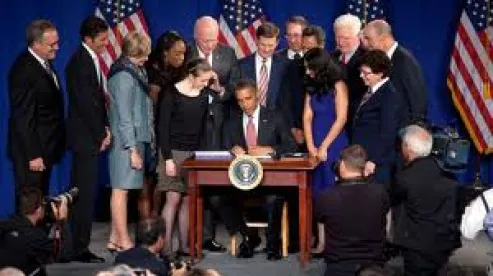President Obama announced yesterday, after his meeting at the White House with Aung San Syuu Kyi, the newly elected President of Myanmar (formerly known, and hereinafter referred to, as Burma), that he intends to lift U.S. sanctions on Burma as a result of that country’s progress toward implementing democracy. The eventual lifting of the sanctions on Burma will take effect when the President: (1) submits certain notifications to Congress; and, (2) issues a new Executive Order that will terminate the national emergency with respect to Burma. When those events take place, the Burmese Sanctions Regulations (found in 31 C.F.R. Part 537) will no longer be in effect. Thereafter, the Treasury Department’s Office of Foreign Assets Control (OFAC) will remove the Burmese Sanctions Regulations from the Foreign Assets Control Regulations. It should be noted that the arms embargo prohibiting exports, reexports and imports of defense articles and services that are subject to the International Traffic in Arms Regulations (ITAR) will continue to be imposed despite the removal of the Burmese Sanctions Regulations in the future.
The U.S. sanctions on Myanmar were implemented in 1997 in response to the Burmese government’s human rights violations and large-scale repression of the democratic opposition. Despite the results of popular democratic elections, the ruling military junta, which controlled the Government of Burma at that time, refused to cede power to the newly elected civilian officials. The U.S. sanctions on Burma prohibited U.S. persons from importing from, exporting or reexporting to, or engaging in a wide variety of activities and transactions with Burma. Subsequent Executive Orders modified the scope of the sanctions program. For example, in 2013, the United States lifted the ban on the importation of Burmese origin goods, except for jade, jadeite, rubies, and products containing these gemstones. In 2014, the United States also eased sanctions on certain financial and investment transactions with Burma.
Currently, the Burmese Sanctions Regulations prohibit U.S. persons from dealing with entities or individuals identified on the Specially Designated Nationals Lists (SDN Lists), or any party that is 50% or more owned (whether individually or in the aggregate, directly or indirectly) by one or more SDNs. In addition, the sanctions continue to prohibit imports of Burmese origin jade, jadeite or ruby products into the United States. As noted above, the United States imposes an arms embargo on Burma that prohibits exports and reexports of ITAR-controlled defense articles and services to Burma, as well as imports of these items from Burma into the United States.
Yesterday, President Obama also submitted formal notification to Congress of his intent to restore Burma’s status as a least developed beneficiary country under the Generalized System of Preferences (GSP). The GSP is a unilateral preferential trade program that permits the duty-free of entry of qualifying merchandise imported from designated developing countries into the United States. The purpose of the GSP is to assist in the economic growth of developing countries. Products from GSP beneficiary countries may be imported into the United States duty-free if:
-
They are wholly the growth, product, manufacture or assembly of a GSP beneficiary country;
-
They are new or different articles of commerce which have been grown, produced, or manufactured in a GSP beneficiary country (or any two or more countries which are members of the same association of countries); or,
-
The sum of the cost or value of the materials produced in the GSP beneficiary country(ies) plus the direct cost of processing operations performed there is not less than 35% of the appraised value of the article at the time of entry into the United States.
In addition, under the direct shipment rule, eligible GSP products must be imported directly into the United States from the beneficiary country(ies). In 1989, the United States suspended preferential treatment for Burma under the GSP. The Trade Act of 1974 authorizes the President to designate GSP beneficiary countries, and requires that Congress be notified at least 60 days before that designation will take effect. The list of designated GSP beneficiary countries can be found in General Note 4(a) of the Harmonized Tariff Schedule of the United States (HTSUS).
Keep in mind that the U.S. sanctions on Burma are still firmly in effect, and the actual termination of the sanctions program will not occur until Congress has been notified and the President issues an Executive Order announcing the lifting of the sanctions. In addition, as noted above, the current arms embargo against Burma will continue unabated despite the eventual lifting of the Burmese Sanctions Regulations, and Burma will still be a Proscribed Country in Part 126.1 of the ITAR.
Even after the sanctions are lifted in the near future, U.S. companies will still need to screen their export transactions and international activities in or with Burma against the various restricted parties lists because by virtue of the fact that certain individuals and entities in Burma will continue to be targets of other U.S. sanctions programs separate and apart from the Burmese Sanctions Regulations (e.g., the Foreign Narcotics Kingpin Sanctions Regulations and the sanctions on North Korea). In addition, for companies desiring to export to Burma, they will still need to classify commodities, software and technologies that are subject to the Export Administration Regulations (EAR) and determine whether a license will be required to be obtained from the Commerce Department’s Bureau of Industry and Security (BIS). Further, U.S. importers will soon have additional sourcing opportunities vis-à-vis Burma, as certain Burmese origin products will again be afforded duty-free treatment under the GSP.



 />i
/>i

